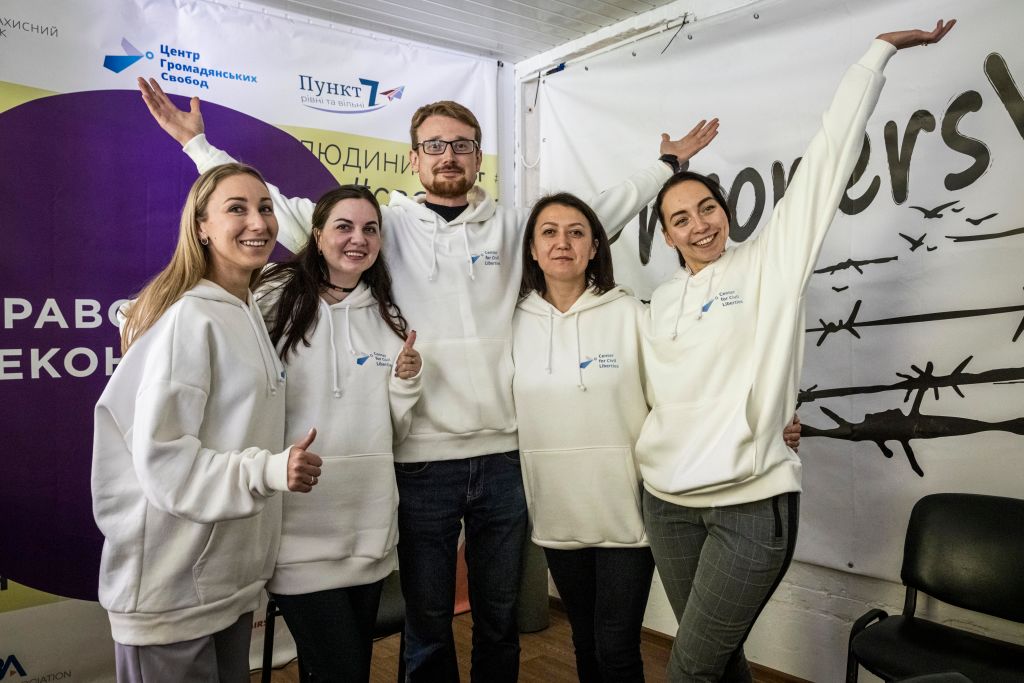Nobel Peace Prize awarded to activists in Russia, Ukraine, and Belarus


A free daily email with the biggest news stories of the day – and the best features from TheWeek.com
You are now subscribed
Your newsletter sign-up was successful
The Nobel Peace Prize was on Friday awarded to Ales Bialiatski, an imprisoned Belarusian human rights advocate; Memorial, a Russian human rights organization; and Center for Civil Liberties (CCL), a Ukrainian human rights organization. Together, the trio have become "symbols of resistance and accountability" during Russia's ongoing war in Ukraine, reports The New York Times.
Bialiatski helped initiate the democracy movement in Belarus in the mid-1980s and founded the organization Viasna, which provided support for jailed demonstrators; the organization has now adopted a broad human rights focus. He's been imprisoned since 2020 for his involvement in demonstrations.
Memorial was first created in the former Soviet Union to ensure victims of communist oppression were remembered. After the Soviet Union collapsed, Memorial became the largest human rights organization in Russia.
The Week
Escape your echo chamber. Get the facts behind the news, plus analysis from multiple perspectives.

Sign up for The Week's Free Newsletters
From our morning news briefing to a weekly Good News Newsletter, get the best of The Week delivered directly to your inbox.
From our morning news briefing to a weekly Good News Newsletter, get the best of The Week delivered directly to your inbox.
CCL was formed in Kyiv in 2007 to advance Ukrainian human rights and democracy. During the current Russian invasion of Ukraine, the organization has worked to "identify and document Russian war crimes against the Ukrainian civilian population," noted the Norwegian Nobel Committee in a press release.
Friday's prize serves as a rebuke of Russian President Vladimir Putin and Belarusian President Alexander Lukashenko, the latter of which was re-elected in a 2020 contest widely denounced as fraudulent, and also allowed Belarus to serve as a starting point for Russia's "failed attempt to seize Kyiv," The Washington Post writes. While Europeans have praised the Nobel committee's selection, Belarus has scorned it, notes The Associated Press.
The Nobel committee wanted to "honor three outstanding champions of human rights, democracy, and peaceful co-existence," it said in its release.
A free daily email with the biggest news stories of the day – and the best features from TheWeek.com
Devika Rao has worked as a staff writer at The Week since 2022, covering science, the environment, climate and business. She previously worked as a policy associate for a nonprofit organization advocating for environmental action from a business perspective.
-
 Quiz of The Week: 14 – 20 February
Quiz of The Week: 14 – 20 FebruaryQuiz Have you been paying attention to The Week’s news?
-
 The Week Unwrapped: Do the Freemasons have too much sway in the police force?
The Week Unwrapped: Do the Freemasons have too much sway in the police force?Podcast Plus, what does the growing popularity of prediction markets mean for the future? And why are UK film and TV workers struggling?
-
 Properties of the week: pretty thatched cottages
Properties of the week: pretty thatched cottagesThe Week Recommends Featuring homes in West Sussex, Dorset and Suffolk
-
 What is ‘Arctic Sentry’ and will it deter Russia and China?
What is ‘Arctic Sentry’ and will it deter Russia and China?Today’s Big Question Nato considers joint operation and intelligence sharing in Arctic region, in face of Trump’s threats to seize Greenland for ‘protection’
-
 What would a UK deployment to Ukraine look like?
What would a UK deployment to Ukraine look like?Today's Big Question Security agreement commits British and French forces in event of ceasefire
-
 Would Europe defend Greenland from US aggression?
Would Europe defend Greenland from US aggression?Today’s Big Question ‘Mildness’ of EU pushback against Trump provocation ‘illustrates the bind Europe finds itself in’
-
 Did Trump just end the US-Europe alliance?
Did Trump just end the US-Europe alliance?Today's Big Question New US national security policy drops ‘grenade’ on Europe and should serve as ‘the mother of all wake-up calls’
-
 Is conscription the answer to Europe’s security woes?
Is conscription the answer to Europe’s security woes?Today's Big Question How best to boost troop numbers to deal with Russian threat is ‘prompting fierce and soul-searching debates’
-
 Trump peace deal: an offer Zelenskyy can’t refuse?
Trump peace deal: an offer Zelenskyy can’t refuse?Today’s Big Question ‘Unpalatable’ US plan may strengthen embattled Ukrainian president at home
-
 Vladimir Putin’s ‘nuclear tsunami’ missile
Vladimir Putin’s ‘nuclear tsunami’ missileThe Explainer Russian president has boasted that there is no way to intercept the new weapon
-
 The Baltic ‘bog belt’ plan to protect Europe from Russia
The Baltic ‘bog belt’ plan to protect Europe from RussiaUnder the Radar Reviving lost wetland on Nato’s eastern flank would fuse ‘two European priorities that increasingly compete for attention and funding: defence and climate’
